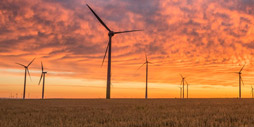
One of the main roles of the Corporate Leaders Group is to develop and document insights from the business community that can help support stronger climate action. These outputs underpin many of the key milestones achieved by the CLG over time.The Corporate Leaders Groups' work covers a range of topics, and the current priority areas are highlighted below. Further themes and categories can be found in the right-hand column. |
Key themes
Aiming for zero |
Energy |
Industrial strategy |
Low carbon buildings |
Transport and mobility |
Just transition and green recovery |
Latest thought leadership
The Materials and Products Taskforce reacts to the release of the Critical Raw Materials Act
16 March 2023
17 March 2023 – The European Commission has released the Critical Raw Materials Act, that aims to increase and diversify the EU’s critical raw materials supply, strengthen circularity and support research and innovation.
2 March 2023
2 March 2023 - A new policy briefing from the UK Corporate Leaders Group (CLG UK) sets out cross-cutting actions to demonstrate strong leadership and longer-term planning.
2 March 2023
2 March 2023 - A new policy briefing from the UK Corporate Leaders Group (CLG UK) applies a business lens to seven key cross-sectoral and cross-governmental areas which are key to achieving net zero, exploring their challenges, opportunities and impacts on business.
19 January 2023
19 January 2023 - The European Commission published its proposal for a Directive on Corporate Sustainability Due Diligence (CSDDD) in February 2022. This critical piece of legislation aims to provide a regulatory framework on corporate sustainability governance. According to CDP’s latest data, more than a third of companies in Europe (37%) report that they have a climate transition plan in place and only 2% of those companies report on all relevant transition plan indicators. CDP defined 8 key elements that constitute a credible climate transition plan . These elements can be identified via disclosure on 24 indicators found in the CDP climate questionnaire.
16 January 2023
17 January 2023 - Three leading business, corporate and investor networks focused on climate change – the Institutional Investors Group on Climate Change (IIGCC) , Corporate Leaders Group (CLG) Europe and Climate Group – came together with over a dozen European business associations and investor networks in a letter to the European Parliament calling for ambitious reform of the EU Energy Performance of Buildings Directive (EPBD). 10 March 2023, this letter has been shared with all Members of the European Parliament ahead of the plenary vote on 14 March.
13 January 2023
The European Commission released its latest set of circular economy policies on 30 November 2022. This included key files such as the Packaging and Packaging Waste Regulation. The purpose of this event was to react to the release of these pieces of legislation and provide a space for key stakeholders to give initial responses to the new legislative initiatives, including policymakers, businesses and third sector organisations. The focus of this event was on the new policies and how they fit into the wider movement towards a more circular European economy. The event offered a collective space to discuss the policies whilst also giving a progressive business view. This event was hosted by CLG Europe’s Taskforce on Climate Neutral and Circular Materials and Products. The Taskforce was launched with the aim of driving forward policy action on sustainable materials by bringing together a group of progressive businesses across sectors and value chains.
3 January 2023
A dialogue between policymakers and business networks for a climate neutral economy.
30 November 2022
30 November 2022 - The European Commission has released the second part of its Circular Economy Package for 2022, the EU’s flagship legislative package that aims to create more sustainable products and materials and enhance circularity. The Taskforce support an ambitious Package, however, calls on policymakers to accelerate action.
Events: Corporate Leaders Groups at COP27, Sharm El-Sheikh, 6-18 November 2022
29 November 2022
Over the two weeks of COP27, CLG Europe and CLG UK hosted a series of discussions and high-level events on business and policy leadership issues to draw on best practice and mobilise concrete action to step up short-term climate action and achieve net zero. Issues explored included the energy transition, national business...
14 November 2022
At this High-Level Event, the European Corporate Leaders Group is bringing together high-level business leaders, experts, and decision makers, including the EU Commissioner for Energy, Kadri Simson and IEA’s Chief Energy Economist Tim Gould to discuss the acceleration of clean energy transition as a response to today’s dual climate and energy crises and the role of businesses in this transition.











